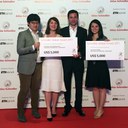Supervisor: Peter Staub
Assistant: Georgia Papathanasiou
During the Winter Semester 2014‐15 Studio Staub successfully participated in the first Schindler Global Award. Out of 250 entries from around the world, the project by Martyna Michalik and Hana Plescakova was selected among 12 finalists. During an award ceremony in Shenzhen, China, they were awarded USD 5’000 for their visionary proposal. This semester, Studio Staub/ Papathanasiou will participate again, still pursuing the same unconventional urban design approach that has led to our previous success in this competition. Following a bottom‐up strategy starting from small scale pop‐up interventions we will develop a framework and later scenarios for an appropriate and visionary transformation of this complex site in São Paulo.
Extract from the competition brief:
“The 2017 competition site is in São Paulo, the main economic engine of Brazil and most populous city in South America. With a population of twelve million and more than twenty million people in the metropolitan region, the city is well established and embedded in global flows of resources, people and power. The city faces challenges at all scales, and the competition asks students to address them using urban design frameworks and strategies.
The competition site is centered on the CEAGESP (Companhia de Entrepostos e Armazéns Gerais de São Paulo) wholesale market, along with its surrounding neighborhood and infrastructures. The CEAGESP will be relocated by the city in the coming years, freeing up a substantial part of the city for redevelopment and change. Its location in the center of São Paulo offers the potential for forward‐thinking approaches to the creation of a new centrality within the city, connected and integrated into the local and regional context.” (Schindler Global Award
Competition Brief, p. 3)
“Four essential topics are meant to guide proposals, and serve as the benchmarks for the
evaluation of entries. Students are free to define additional considerations, but the following
topics should be used to ensure holistic designs:
1. Regional and local urban design impact
2. Mobility and public space integration
3. Urban living, urban economy and creation of jobs
4. Cultural, social and architectural heritage
An international jury of renowned experts will evaluate the entries and allocate awards, with a
total prize sum of 105,000 USD.” (Schindler Global Award Competition Brief, p. 6)













